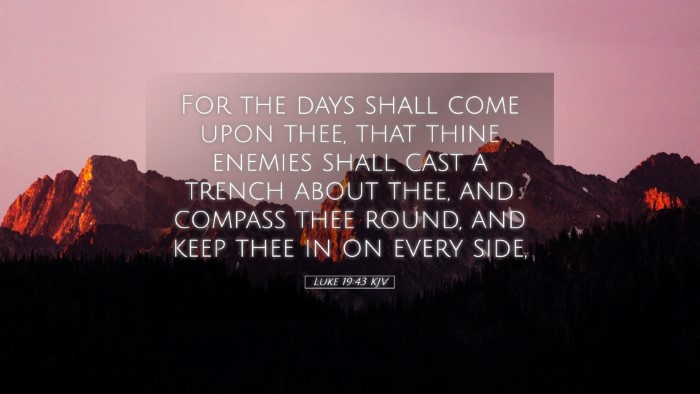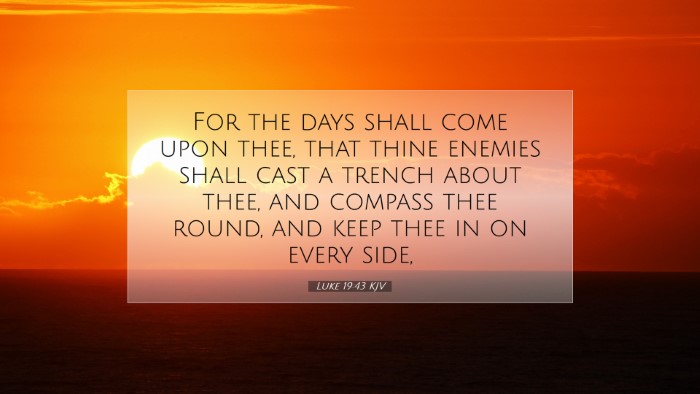Bible Commentary on Luke 19:43
Verse Text: "For the days will come upon you, when your enemies will set up a barricade around you and surround you and hem you in on every side."
Historical Context
Background: This scripture is part of the lamentation of Jesus over Jerusalem, occurring shortly before His Passion. In a sobering tone, Christ foresaw the siege of Jerusalem, which would culminate in the destruction of the city in 70 A.D. This prophetic utterance reveals both the temporal judgment and the spiritual implications of Israel's rejection of their Messiah.
Insight from Matthew Henry
Matthew Henry highlights the sorrowful heart of Jesus as He mourns over Jerusalem's imminent doom. He notes that Jesus does not merely speak condemnation but rather expresses profound grief for a city that was intended to be a light but ultimately chose darkness. Henry emphasizes the tragic irony that the people of Jerusalem, who were supposed to welcome their Redeemer, would instead face destruction.
Key Observations:
- The phrase "the days will come" signifies a prophetic foresight, suggesting inevitability and divine judgment for the rejection of Christ.
- The imagery of being surrounded conveys the inescapable fate of Jerusalem and signifies the complete inability to escape the consequences of their sin.
- Henry points out the compassionate nature of Christ, who laments the tragedy of the people’s choices.
Insights from Albert Barnes
Albert Barnes provides a theological perspective on this verse, asserting that it serves as a warning of internal and external destruction for those who turn away from God. He interprets the 'enemies' as both spiritual and physical foes that reflect a broader theme of opposition faced by believers when they reject divine guidance.
Theological Significance:
- The 'barricade' symbolizes the spiritual barriers that arise through sin, ultimately leading to downfall.
- The surrounding of Jerusalem serves as a metaphor for the encirclement of the soul by sin and its consequences.
- Barnes points out that this prophecy not only pertains to Jerusalem's destruction but also serves as a foreshadowing of the eventual fate of all who resist divine intervention.
Exegesis by Adam Clarke
Adam Clarke offers a detailed exegesis of the sociopolitical factors influencing Jerusalem during this time. He elucidates how the city’s leadership had become blind to spiritual truth, leading to their demise. Clarke emphasizes that the prophecy reveals Christ’s deep concern for his followers and the consequences of national disobedience.
Critical Points:
- Clarke explains the historical context of Roman ascendancy and the sociopolitical upheaval that would catalyze Jerusalem's downfall.
- The 'enemies' could represent both foreign invaders and internal dissent, highlighting the multifaceted nature of Jerusalem's struggles.
- Referring to Jesus' warning as an "affectionate declaration," Clarke emphasizes Jesus' role as both prophet and sympathetic Savior.
Application for Today
For pastors, students, theologians, and biblical scholars, Luke 19:43 serves as a critical reminder of the importance of spiritual vigilance and the reality of consequence that follows disobedience to God. This passage urges reflection on both personal and communal fidelity to God and His teachings. It warns of the peril of societal rejection of divine truth, illustrating that the consequences are often profound and far-reaching.
Practical Reflections:
- This verse invites church leaders to shepherd their congregations with compassion, aware of the spiritual battleground around them.
- It encourages individuals to examine the 'barricades' in their own lives that may hinder their relationship with God.
- Luke 19:43 is a call to evangelism, reminding us of the urgency to share the Gospel with those who may be oblivious to impending judgment.
Conclusion
In summary, Luke 19:43 encapsulates both a prophetic warning and a lament from Jesus, rich with historical context and theological depth. Insights from Matthew Henry, Albert Barnes, and Adam Clarke bring to light the multifaceted implications of this verse. Their contributions remind us of God's enduring compassion amid judgment, serving as an essential message for believers in every generation.


